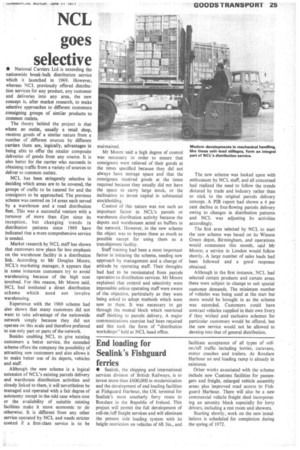NCL goes selective
Page 27

If you've noticed an error in this article please click here to report it so we can fix it.
• National Carriers Ltd is extending the nationwide break-bulk distribution service which it launched in 1969. However, whereas NCL previously offered distribution services for any product, any customer and deliveries into any area, the new concept is, after market research, to make selective approaches to different customers consigning groups of similar products to common outlets.
The theory behind the project is that where an outlet, usually a retail shop, receives goods of a similar nature from a number of different sources by different carriers there are, logically, advantages in being able to offer the retailer composite deliveries of goods from any source. It is also better for the carrier who succeeds in obtaining traffic from a variety of sources to deliver to common outlets.
NC L has been stringently selective in deciding which areas are to be covered, the groups of traffic to be catered for and the consignors to be approached. The previous scheme was centred on 14 areas each served by a warehouse and a. road distribution fleet. This was a successful venture with a turnover of more than itm since its inception, but changing trends in distribution patterns since 1969 have indicated that a more comprehensive service is needed.
Market research by NCL staff has shown that customers now place far less emphasis on the warehouse facility in a distribution link. According to Mr Douglas Moore, NCL's marketing manager, it appears that in some instances customers try to avoid warehousing because of the high cost involved. For this reason, Mr Moore said, NCL had instituted a direct distribution scheme which need not involve warehousing.
Experience with the 1969 scheme had also shown that many customers did not want to take advantage of the nationwide network simply because they did not operate on this scale and therefore preferred to use only part or parts of the network.
Besides enabling NCL to give existing customers a better service, the extended scheme offers the company the possibility of attracting new customers and also allows it to make better use of its depots, vehicles and staff.
Although the new scheme is a logical extension of NC L's existing parcels delivery and warehouse distribution activities and closely linked to them, it will nevertheless be managed and operated with a fair degree of autonomy except in the odd case where cost or the availability of suitable existing facilities make it more economic to .do otherwise. It is different from any other service operated by NCL and needs stricter control if a first-class service is to be
maintained.
Mr Moore said a high degree of control was necessary in order to ensure that consignors were relieved of their goods at the times specified because they did not always have storage space and that the consignees received goods at the times required because they usually did not have the space to carry large stock, or the inclination to invest capital in substantial stockholding.
Control of this nature was not such an important factor in NC L's parcels or warehouse distribution activity because the depots and warehouses acted as buffers in the network. However, in the new scheme the object was to bypass these as much as possible except for using them as a transhipment facility.
Staff training had been a most important factor in initiating the scheme, needing new approach by management and a change of attitude by operating staff. Their thoughts had had to be reorientated from parcels operation to distribution services. Mr Moore explained that control and selectivity were impossible unless operating staff were aware of the objective, particularly as they were being asked to adopt methods which were new to them. It was necessary to get through the mental block which restricted staff thinking to parcels delivery. A major communications exercise had been required and this took the form of "distribution workshops" held at NCL head office. The new scheme was looked upon with enthusiasm by NC L staff, and all concerned had realized the need to follow the trends dictated by trade and industry rather than to stick to the original parcels delivery concept. A PIB report had shown a 4 per cent decline in free-flowing parcels delivery owing to changes in distribution patterns and NCL was adjusting its activities accordingly.
The first area selected by NCL to start the new scheme was based on its Winson Green depot, Birmingham, and operations would commence this month, said Mr Moore; a service in London would follow shortly. A large number of sales leads had been followed and a good response obtained.
Although in the first instance, NCL had selected certain products and certain areas these were subject to change to suit special customer demands. The minimum number of vehicles was being used at the start but more would be brought in as the scheme was extended. Customers could have contract vehicles supplied in their own livery if they wished and exclusive schemes for particular customers would be offered, but the new service would, not be allowed to develop into that of general distribution.


































































































































































